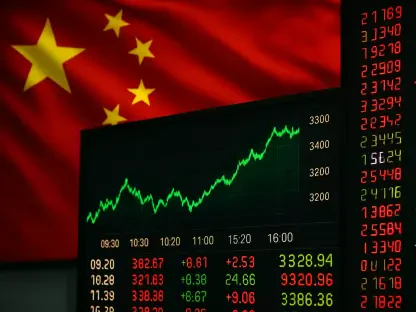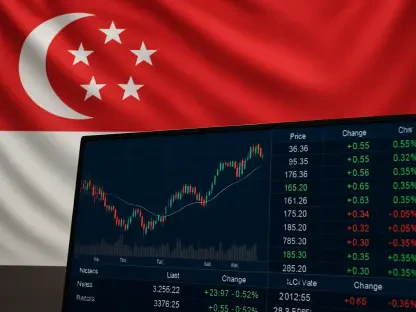Canada faces growing economic threats from adversarial states like China and Russia, as well as unexpected issues arising from its trade relationship with the United States. These challenges necessitate a comprehensive evaluation and strengthening of Canada’s economic statecraft strategy to ensure both national security and economic stability. The introduction of tariffs, intellectual property theft, and state-sponsored cyberattacks elucidate the urgency for Canada to develop a cohesive and resilient economic plan.
Economic Threats to Canada’s National Security
Canada’s critical infrastructure is increasingly becoming a target for state-sponsored cyberattacks, especially from Russia. Critical sectors such as energy, telecommunications, and financial services are essential to the country’s economy and national security, making them prime targets for sabotage. These cyberattacks can create considerable disruptions, compromising the integrity and functionality of vital systems. Recent ransomware attacks have also cost Canadian companies billions of dollars, indicating a dire need to bolster cyber defenses and partnerships to mitigate these risks.
Intellectual property theft is another significant concern for Canadian companies, particularly regarding Chinese state actors. Sensitive technologies and research are frequently targeted, posing a threat to both national security and economic competitiveness. Canadian businesses are at risk of losing important innovations, which could adversely affect the country’s global position in key industries. Establishing stronger cyber protections, stricter enforcement of intellectual property laws, and creating awareness among businesses about these risks are critical steps toward safeguarding intellectual property.
China’s influence on the academic sector is more insidious but equally dangerous. Strategic collaborations between Chinese and Canadian institutions, ostensibly for academic research, often serve as a front for enhancing China’s military and technological capabilities. These partnerships can lead to the unintentional transfer of sensitive technologies, which are then utilized to bolster foreign military and strategic initiatives. As a result, the Canadian federal government has started imposing restrictions on grant eligibility for institutions that collaborate with adversarial states on sensitive research topics, aiming to curb this covert channel of influence.
The weaponization of trade by China compounds these threats, notably impacting sectors like Canada’s canola industry. When countries employ trade as a geopolitical tool, it can lead to significant economic consequences, as seen through China’s imposition of tariffs and trade restrictions. Canada’s response includes implementing counter-tariffs to defend its industries and using diplomatic channels to resolve disputes. A more strategic approach to trade negotiations and stronger alliances with other trading partners are essential to counteract such economic aggressions effectively.
Overdependence on US Trade
The unexpected imposition of US tariffs on Canadian goods has brought to light an alarming vulnerability: Canada’s significant trade dependence on the United States. This dependency exposes the Canadian economy to abrupt and damaging policy changes in Washington, which can reverberate across national industries. Diversifying trade is imperative to reduce such vulnerabilities and ensure stability amidst fluctuating US-Canada relations.
The Trans Mountain Pipeline project is one initiative aimed at expanding Canada’s reach into global markets. By facilitating the export of oil to international customers rather than relying solely on the US, Canada can mitigate some of the risks associated with its current trade patterns. However, while these efforts are crucial steps in the right direction, the sectors of crude oil and auto manufacturing remain heavily tied to the US market, highlighting the need for broader diversification strategies.
This overreliance on a single trading partner can also disrupt defense cooperation, given that economic tensions often spill over into other areas of partnership. Rising economic friction could potentially strain the longstanding defense collaborations between Canada and the US. Although structures like the North American Aerospace Defense Command (NORAD) currently remain stable, continuous economic engagements might frazzle military ties.
Canada has begun exploring alternatives in its defense procurements, evidenced by the review of its F-35 fighter jet deal with the US. This indicates a proactive stance in seeking diverse suppliers and reducing dependency on any single nation for critical defense equipment. Exploring alliances and partnerships with other countries for procurement of advanced defense technologies will strengthen Canada’s defense capabilities independently.
Fragmented Economic Power
A significant challenge to forming a cohesive economic strategy in Canada is the division of economic control between the federal and provincial governments. Provinces wield considerable power over natural resources, which can sometimes conflict with national interests. The decentralized control hampers Canada’s ability to employ a unified and strategic economic response to threats, as provincial priorities can diverge from federal policy objectives.
For instance, Alberta, a major oil-producing province, often prioritizes its economic interests over national strategy, as seen in its refusal to increase levies on oil and gas exports. These provincial standpoints can undermine Canada’s leverage in negotiations with the US, where a unified stance could potentially bring about more favorable outcomes. Strengthening collaboration between federal and provincial governments would enable a more coordinated and powerful economic strategy.
To address these fragmented powers, establishing frameworks for better cooperation and communication is essential. Creating intergovernmental task forces that prioritize national economic security can enhance decision-making processes and ensure that all levels of government are aligned in their objectives. Additionally, incentivizing provinces to contribute to national economic strategies can create a more robust and cohesive approach to tackling economic threats.
Canada’s Economic Statecraft Systems
Sanctions
Canada has adopted a range of financial sanctions designed to align with those of G7 allies, targeting countries that pose significant risks to national security, such as Russia and Iran. Sanctions serve as a vital tool in Canada’s economic statecraft arsenal, enabling the country to exert pressure on adversarial states without resorting to military action. These measures are intended to curtail the destabilizing activities of rogue states by restricting their access to international financial systems and resources.
The enforcement of these sanctions is a coordinated effort among various organizations. Global Affairs Canada (GAC), the Financial Transactions and Reports Analysis Centre of Canada (FINTRAC), the Office of the Superintendent of Financial Institutions (OSFI), the Royal Canadian Mounted Police (RCMP), and the Canada Border Services Agency (CBSA) all play critical roles in the implementation and enforcement of these financial restrictions. Ensuring robust and effective sanctions enforcement requires continuous collaboration and resource allocation across these agencies.
Export Controls
Canada’s export controls are designed to align with multilateral regimes and comprehensive lists managed by Global Affairs Canada. These controls aim to prevent the transfer of sensitive technologies and goods that could enhance the military capabilities of adversarial states. The Canada Border Services Agency (CBSA) enforces these regulations, referring cases to the RCMP when necessary to ensure compliance and address violations.
Recent discussions have called for Canada to impose strategic restrictions on mineral exports to the US, leveraging its natural resource assets as a form of positive economic statecraft. By using export controls more strategically, Canada can further protect its critical industries and national security while exerting influence on global markets. However, balancing these restrictions without disrupting global supply chains remains a delicate task that requires careful planning and international cooperation.
Tariffs
Under the Customs Act, Canada employs tariffs as a principal mechanism for protecting domestic industries against unfair trade practices. By imposing tariffs aligned with allied economies, Canada can effectively counteract dumping and subsidized imports that threaten its market stability. The Special Import Measures Act (SIMA) provides the legislative framework for these actions, enabling the country to respond swiftly to trade imbalances.
However, the heavy dependence on US trade relations poses significant challenges. While protective measures are necessary to shield domestic industries, they must be balanced to avoid escalating trade disputes that could harm bilateral relations. Strengthening global trade alliances and expanding trade partnerships can reduce reliance on any single market and enhance economic resilience.
Investment Screening
The Investment Canada Act is crucial for overseeing foreign investments and safeguarding national security interests amid rising economic threats. By scrutinizing foreign investments, Canada aims to prevent entities with adversarial intent from acquiring control over critical industries and infrastructure. The act has seen recent amendments to better reflect the current geopolitical climate and include the perspectives of Canadian companies in the approval process.
These updates have made the investment screening process more robust and responsive to evolving threats, ensuring that foreign investments align with national security and economic stability. By maintaining stringent investment screening measures, Canada can protect its industries from foreign control that could potentially compromise national interests.
Positive Economic Statecraft
Canada’s engagement in international development assistance, particularly in Africa, has become increasingly significant. As the US retreats from foreign aid, Canada has an opportunity to fill the void, forming strategic economic alliances and enhancing its influence on the global stage. By supporting development projects, Canada can foster goodwill, open new markets, and create economic partnerships that bolster its long-term economic and strategic interests.
The strategic use of development assistance serves as a form of positive economic statecraft, enabling Canada to promote stability and growth in regions of interest while advancing its foreign policy goals. These efforts not only enhance global standing but also contribute to a more secure and prosperous international environment. Leveraging its positive economic influence can help Canada build resilient trade networks and reduce dependency on volatile partners.
Enhancing Economic Resilience
Canada is increasingly facing significant economic threats from adversarial nations such as China and Russia. Additionally, there are unexpected challenges emerging from its trade relationship with the United States. This concerning situation demands a thorough examination and bolstering of Canada’s economic statecraft strategy to secure both the nation’s economy and its security. Several critical factors highlight the urgency of this matter. For instance, the imposition of tariffs affects trade balances and economic health, while the theft of intellectual property undermines Canadian innovation and commercial interests. Moreover, state-sponsored cyberattacks pose serious risks to national security and the economic infrastructure.
These escalating threats make it clear that Canada must develop a cohesive and robust economic strategy that can adapt to and counteract these adversarial actions. By reinforcing economic policies, enhancing cybersecurity measures, and ensuring the protection of intellectual property, Canada can work towards safeguarding its economic stability and national security. This comprehensive approach is crucial for the country to navigate the complex global economic landscape and protect its interests against a variety of external pressures.









